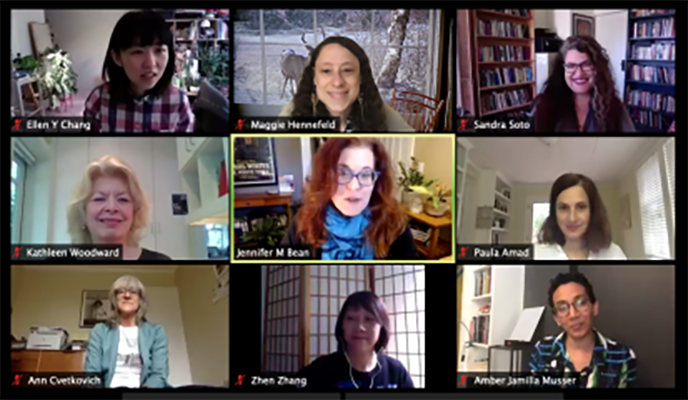
On May 15, Feminist Media Histories: An International Journal marked its move to the University of Washington with an online workshop on affect attended by more than 200 people from around the world. Initially designed as a two-day celebration of the journal's transition to Seattle, where it will now be housed at the Simpson Center for the Humanities.
On May 15, Feminist Media Histories: An International Journal marked its move to the University of Washington with an online workshop on affect attended by more than 200 people from around the world. Initially designed as a two-day celebration of the journal's transition to Seattle, where it will now be housed at the Simpson Center for the Humanities, this workshop, organized by the new editor-in-chief, Professor Jennifer M. Bean, was moved online.
The four-hour workshop featured presentations by seven speakers, including Paula Amad (University of Iowa), Ann Cvetkovich (Carleton University), Maggie Hennefeld (University of Minnesota, Twin Cities), Amber Jamilla Musser (Georgetown University), Sandra Soto (University of Arizona), Zhen Zhang (New York University), and Simpson Center Director Kathy Woodward (University of Washington). Each presenter considered how the term “affect,” and its cognates, enables us to think, describe, name, or feel feminist and queer media histories differently. Media objects discussed ranged from art installations to experimental videos, and from early cinema to African relics and photographic memoirs.
The workshop will inform a special issue of Feminist Media Histories (FMH 7.2). The journal publishes original research, oral histories, primary documents, conference reports, and archival news on radio, television, film, video, digital technologies, and other media across a range of historical periods and global contexts. Inter-medial and trans-national in its approach, Feminist Media Histories examines the historical role gender has played in varied media technologies, and documents women’s engagements with these media as audiences, users and consumers, creators and executives, critics, writers and theorists, technicians and laborers, educators, activists, and librarians.